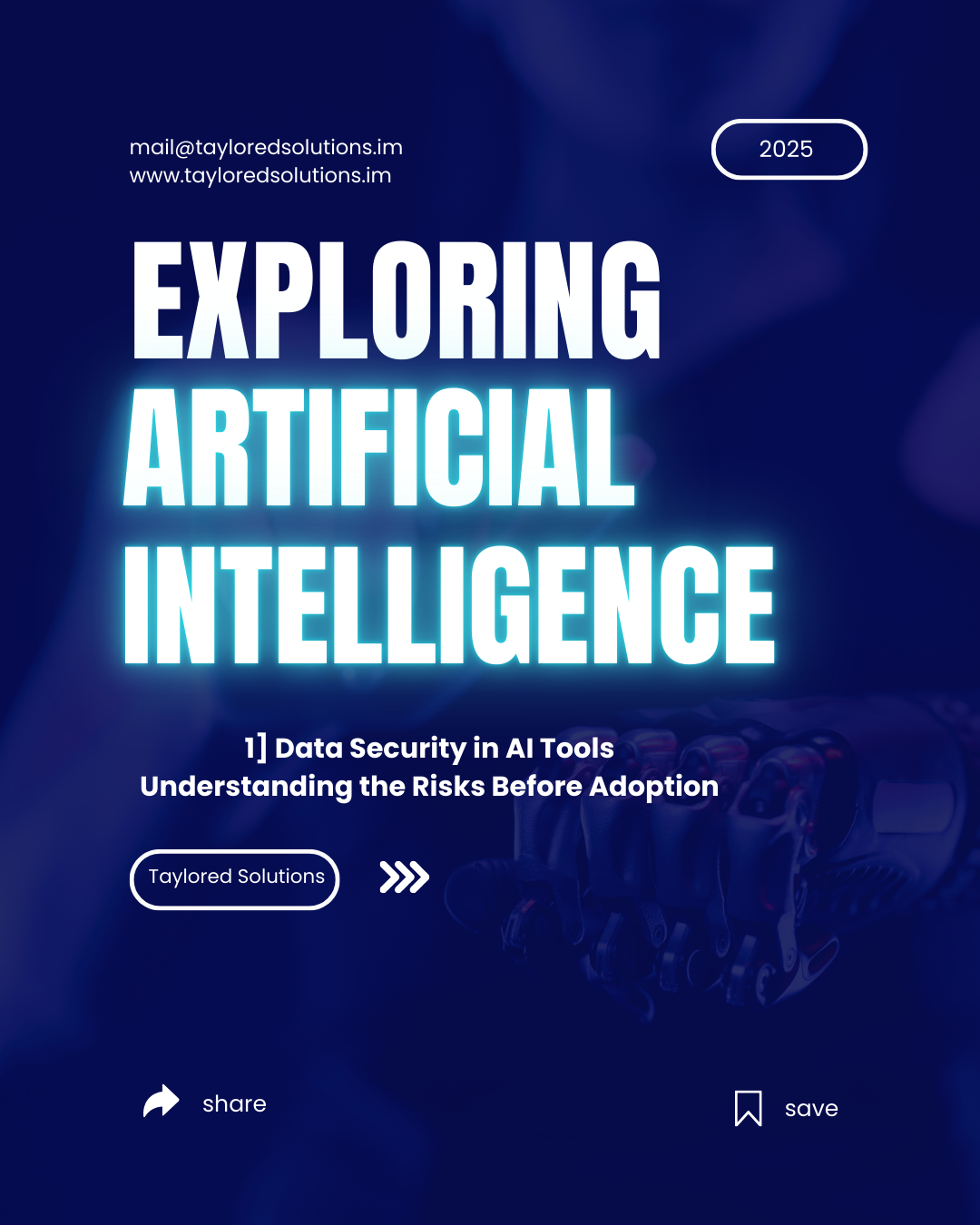Exploring Artificial Intelligence [1]
Data Security in AI Tools. Understanding the Risks Before Adoption.

Data Security in AI Tools: Enabling Safe Innovation
Introduction
The AI revolution has arrived in the business world, bringing remarkable opportunities for increased efficiency, deeper insights, and competitive advantages. These powerful tools are transforming how organisations operate and deliver value to customers. As with any significant technological advancement, responsible implementation requires attention to security considerations. By understanding and addressing potential data security implications, businesses can confidently integrate AI into their processes and fully realise its benefits.
This article explores how organisations can effectively harness AI's transformative potential while implementing practical safeguards to protect sensitive information. By taking a thoughtful, security-conscious approach, businesses can embrace AI innovation with confidence.
The Current Landscape: AI Adoption and Security Considerations
AI tools have become increasingly accessible to companies of all sizes. From customer service chatbots to predictive analytics platforms and medical breakthroughs, these technologies offer significant benefits but also create new security challenges. According to recent studies:
- 35% of companies are now using AI in some capacity
- 42% of executives believe AI will be "critically important" to their business within two years
- According to a CybSafe report (26 September 2024), approximately 40% of employees share sensitive information with AI tools without their employer's knowledge
- The global AI market continues to expand rapidly, increasing the urgency of addressing security considerations
With this rapid adoption comes significant security concerns. Many AI systems require access to sensitive business data, customer information, and proprietary content to function effectively. This creates new attack vectors and compliance challenges that organisations must address.
Learning from Past AI Implementation Challenges
While AI offers tremendous benefits, examining past implementation challenges provides valuable insights for successful adoption:
Enterprise Software Company (2023)
Scenario: Employees at a major software company shared proprietary code with a generative AI system without clear guidelines on appropriate use.
Resolution: The company developed comprehensive AI usage policies and implemented secure, enterprise-grade AI tools specifically designed for code review and development. These changes enhanced productivity whilst protecting intellectual property.
Financial Services Firm (2022)
Scenario: Advisers at a financial services firm used an AI-powered text analysis tool that wasn't properly integrated into their data governance framework.
Resolution: The firm implemented a structured AI adoption programme with appropriate security controls and training. This approach allowed them to benefit from AI's analytical capabilities whilst maintaining strict data protection standards.
Healthcare Network (2023)
Scenario: A healthcare service adopted an AI diagnostic tool without fully evaluating its data handling practices and encryption standards.
Resolution: After enhancing their vendor evaluation process, the service successfully implemented AI tools that maintained HIPAA compliance through proper encryption and data segregation, leading to improved diagnostic capabilities.
Government Department (2022)
Scenario: Government staff used publicly available AI translation services for document processing without appropriate security controls.
Resolution: The department implemented secure, approved AI translation tools with appropriate data handling certifications, allowing staff to benefit from AI language capabilities whilst maintaining information security.
Key Security Considerations for AI Systems
As businesses adopt AI tools, awareness of these security considerations helps ensure successful implementation:
1. Data Retention Policies
AI services often retain user inputs to improve their models. Understanding a vendor's data retention policies ensures alignment with your organisation's data governance requirements and regulatory obligations.
2. Prompt Engineering Security
Well-designed AI systems include safeguards against prompt manipulation. Evaluating these protections helps maintain the confidentiality of sensitive information processed by AI tools.
3. Managed AI Adoption
With AI's growing popularity, employees may adopt tools independently. Creating clear policies and approved tool lists helps channel enthusiasm productively while maintaining security standards. Ensure no sensitive data is input into generic public AI tools.
4. Model Privacy Protections
Advanced AI systems should incorporate privacy-preserving techniques that prevent unauthorised data reconstruction. Verifying these protections ensures data remains secure even as models learn and evolve.
5. API Security Implementation
Robust AI implementations include strong API security with proper authentication, rate limiting, and encryption. These technical measures form an essential part of a comprehensive security approach.
Strategic Assessment Framework for AI Implementation
A thoughtful evaluation process helps organisations maximise AI benefits while maintaining appropriate data protections:
Data Strategy Planning
- Identify what types of data will enhance AI tool effectiveness
- Determine whether personally identifiable information (PII), financial data, or intellectual property will be processed
- Consider the appropriate security classification for this data
Vendor Partnership Evaluation
- Review how vendors protect and secure client data
- Confirm compliance with relevant industry standards (ISO 27001, SOC 2, HIPAA, etc.)
- Ensure data processing agreements align with your organisational requirements
Technical Implementation Planning
- Evaluate encryption standards and security architecture
- Consider data anonymisation or pseudonymisation options to enhance privacy
- Explore deployment options including on-premises and private cloud instances
Regulatory Alignment
- Verify compatibility with relevant regulations (GDPR, CCPA, HIPAA, etc.)
- Understand how data subject rights and consent are managed
- Confirm availability of appropriate audit logs and documentation
Practical Security Measures for AI Implementation
1. Develop a Comprehensive AI Governance Policy Create clear guidelines for AI tool adoption, usage, and data handling across your business. This should include an approval process, security requirements, and acceptable use policies.
2. Implement Technical Controls
- Data anonymisation and sanitisation before AI processing
- Network segmentation to isolate AI systems
- Robust authentication and access controls
- Encryption for data in transit and at rest
3. Conduct Regular Security Audits
Schedule periodic security assessments specifically focused on AI tools and their data handling practices. This should include penetration testing and vulnerability scanning.
4. Provide Employee Training
Educate staff about the risks associated with AI tools and their responsibilities for protecting sensitive data. This should include recognition of phishing attempts targeting AI credentials.
5. Establish Incident Response Protocols Develop specific procedures for responding to AI-related data breaches, including containment strategies, notification processes, and recovery plans.
Balancing Innovation with Security
Implementing robust security measures need not impede technological progress. Companies can maintain both security and innovation by:
1. Starting with less sensitive data sets for initial AI implementations
2. Embedding security considerations from the earliest stages of AI projects
3. Utilising controlled testing environments for development and evaluation
4. Applying security controls proportionate to the sensitivity of data being processed
Conclusion
AI represents one of the most promising technological advancements of our era, offering unprecedented opportunities to enhance productivity, drive innovation, and create new value. As AI becomes increasingly integrated into business operations, organisations that thoughtfully incorporate security considerations will be able to adopt these technologies with confidence and purpose.
By understanding the specific considerations unique to AI systems and implementing appropriate safeguards, businesses can fully embrace artificial intelligence while maintaining the integrity of their most valuable assets—their data and customer trust.
In a nutshell, AI can be a powerful tool but always check where your data goes. If in doubt leave it out.
Additional Resources
1. NIST AI Risk Management Framework: This framework, developed by the National Institute of Standards and Technology (NIST), provides guidelines for managing risks associated with artificial intelligence.
NIST AI Risk Management Framework
2. EU AI Act Overview: The European Unions Artificial Intelligence Act aims to regulate AI technologies to ensure they are safe and respect existing laws on fundamental rights and values.
3. ISO/IEC 27001 Information Security Management Standards: ISO/IEC 27001 is an international standard providing a framework for information security management systems to ensure the security of data.
ISO/IEC 27001 Information Security Management Standards
4. CybSafe Report on Employee AI Use (September 2024): This report highlights the trends and concerns related to employees sharing sensitive information with AI tools without employer authorisation.
CybSafe Report on Employee AI Use
These resources provide comprehensive insights into AI risk management, regulatory frameworks, and current challenges in AI-related data security.
*This article is part of our "Exploring AI" series, designed to help businesses navigate the opportunities and challenges of artificial intelligence implementation




